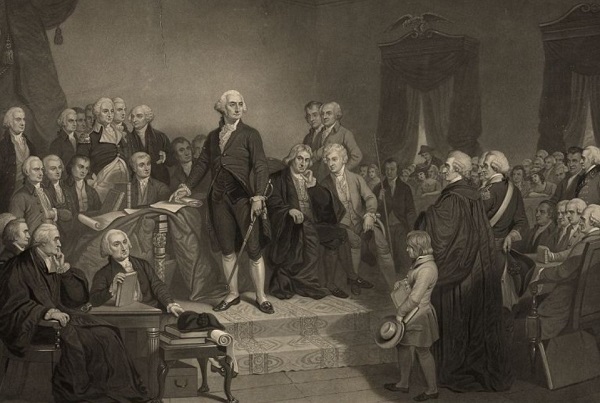Alberta
Danielle Smith vows to fight Trudeau’s ‘unconstitutional’ plan to ban gas-powered cars

From LifeSiteNews
Alberta’s premier called a federal government directive that all new vehicles are electric by 2035 ‘a disaster.’
Alberta Premier Danielle Smith made it crystal clear that she intends to fight with “everything” at her disposal what she called an “unconstitutional” new federal government mandate that all new cars and trucks by 2035 be electric, which would in effect ban the sale of new gasoline- or diesel- only powered vehicles after that year.
“The Government of Alberta will do everything within its legal jurisdiction to thwart implementation of these unconstitutional regulations in our province,” Smith said in a statement yesterday on the EV mandate that was posted to X (formerly Twitter).
“The sheer hypocrisy of this announcement is astounding. To date, the federal government’s EV approach has been a disaster.”
On Tuesday, Canadian Environment Minister Steven Guilbeault announced the “Electric Vehicle Availability Standard.” This is a plan that will try and mandate more EV or so-called “zero-emission vehicles” (ZEV) sales via increasing targets per year.
Starting in 2026, the federal government will mandate that 20% of all new cars or trucks are ZEV. That number will move to 60% by 2030 and to 100% by 2035. So-called cars that qualify under the new rules are battery electric, plug-in hybrid, or hydrogen fuel cars.
This is not the first time Smith has called out federal EV mandates. Early this year, she blasted what was then a Trudeau government proposal to ban new sales of gas-powered cars after 2035. She called it an attack on her province’s oil and gas industry.
Trudeau’s war on the internal combustion engine comes despite the fact Canada has the third largest oil reserves in the world, which is produced ethically, unlike in other nations.
Electric cars cost thousands more to make and buy, are not suited to Canada’s cold climate, offer poor range and long charging times (especially in cold weather), and have batteries that take tremendous resources to make and are hard to recycle.
A recent report from the Western Standard documents how one Alberta couple found out the hard way that going EV does save not time or money.
Trudeau’s EV mandates have also been called out by the automotive industry in Canada. The Canadian Vehicle Manufacturers’ Association said in response to the new EV mandate that forcing people to buy EVs will “disproportionately impact households living in rural and northern communities that may have lower access to public charging infrastructure.”
“In addition, northern communities are expected to face more difficulties with the transition to EVs due to prolonged periods of cold temperatures that may affect the range of battery-powered electric vehicles.”
Conservative Party of Canada leader Pierre Poilievre said he would overturn Trudeau’s “Draconian” EV mandate should he win the next election and his party form government.
Smith warns power grids won’t be able to handle extra pressure of EVs
Smith noted that when it comes to Trudeau’s EV mandate, “Ottawa is trying to force increased demands on the electricity grid while simultaneously weakening Alberta’s and other provinces’ grids through their federal electricity regulations.”
“Our electric grids are not equipped to handle the massive demand surge that a forced full-scale transition to EVs would need to accommodate the delusional timelines in Ottawa’s regulations, and the federal government has not provided remotely enough financial assistance to assist provincial grids to meet this mandated electricity demand,” she noted.
Smith was clear that while the Alberta government “supports reducing emissions from the transportation sector,” it also supports choice when it comes to what kind of car or truck a person wants to buy.
She said any new rules should be led by “consumers and businesses” and not by government decree.
“The federal government has no legal or moral authority to tell Albertans what vehicles they can and cannot buy,” she said.
“The federal government should rein back its failed command economy tactics and work with us on a consumer-based market approach that is achievable and doesn’t hurt people.”
Smith then took a shot at the Trudeau Liberals and its lack of a plan when it comes to supporting the power grid.
“Not only are there not enough electric vehicle chargers, Ottawa doesn’t even know where EV chargers are needed. The federal government will fail to hit its target even where it has complete discretion, and yet it plans to mandate similar targets on consumers throughout all of Canada,” she said.
“Although it seems rather obvious to say, emissions targets and regulations must be realistic, achievable, and cannot result in multiple severe harms to millions of Canadians. A federal government that can’t transition its own fleet to EVs should not be telling Albertans and Canadians to do what even it is unable to do.”
Since taking office in 2015, Trudeau has continued to push a radical environmental agenda similar to the agendas being pushed the World Economic Forum’s “Great Reset” and the United Nations “Sustainable Development Goals.”
The reduction and eventual elimination of the use of so-called “fossil fuels” and a transition to unreliable “green” energy has also been pushed by the World Economic Forum (WEF) – the globalist group behind the socialist “Great Reset” agenda – an organization in which Trudeau and some of his cabinet are involved.
A June 2017 peer-reviewed study by two scientists and a veteran statistician confirmed that most of the recent global warming data have been “fabricated by climate scientists to make it look more frightening.”
There have been two recent court rulings that have dealt a blow to Trudeau’s environmental laws.
The most recent was the Federal Court of Canada on November 16 overturned the Trudeau government’s ban on single-use plastic, calling it “unreasonable and unconstitutional.”
The second ruling comes after Canada’s Supreme Court recently sided in favor of provincial autonomy when it comes to natural resources. The Supreme Court recently ruled that Trudeau’s law, C-69, dubbed the “no-more pipelines” bill, is “mostly unconstitutional.” This was a huge win for Alberta and Saskatchewan, which challenged the law in court. The decision returned authority over the pipelines to provincial governments, meaning oil and gas projects headed up by the provinces should be allowed to proceed without federal intrusion.
The Trudeau government, however, seems insistent on defying the recent rulings by pushing forward with its various regulations.
Alberta
Province announces next step to revamped health care system

Setting the foundation for a refocused health system
Proposed legislation would support the refocusing of Alberta’s health care system to ensure Albertans get the care they need when and where they need it.
On Nov. 8, 2023, Alberta’s government announced plans for a refocused health care system to ensure patients are receiving the care they need, when and where they need it. To achieve this, Alberta’s government will be creating four new organizations, one for each priority health services sector: acute care, primary care, continuing care and mental health and addiction.
If passed, the Health Statutes Amendment Act would enable the government to take the necessary next steps to refocus the province’s health care system. The legislation would ensure Albertans have a system that works for them by prioritizing their need to find a primary care provider, receive urgent care without long waits, have access to the best continuing care options and obtain excellent mental health and addiction treatment.
“We are taking another step toward improving health care by updating legislation and enabling the governance and oversight required to refocus the health system. The critical improvements to transparency and accountability will help support the successful refocusing of the health care system to one that is responsive, effective and reflects the needs and priorities of Albertans today and for future generations.”
The Health Statutes Amendment Act will enable the transition from one regional health authority, Alberta Health Services, to an integrated system of four sector-based provincial health agencies including primary care, acute care, continuing care and mental health and addiction. The agencies will be responsible for delivering integrated health services, ensuring Albertans receive timely access to care, regardless of where they live.
The Health Statutes Amendment Act establishes roles for an oversight minister and sector minister. The Minister of Health will take on the role of oversight minister, responsible for setting the strategic direction of the overall health system. A sector minister will be responsible for a specific health services sector. For example, the sector minister for Recovery Alberta is the Minister of Mental Health and Addiction. On the recommendation of the oversight minister, additional health service sectors may be established and designate a minister responsible for that newly created sector.
Enhanced government oversight will help Alberta’s government to better direct resources to the front lines where they are needed the most, improve patient care overall and support health care professionals.
“Mental health and addiction have been growing issues within our society and need to be prioritized within our health care system. Amid an addiction crisis, a refocused health system will allow for mental health and addiction services to get the attention, oversight and focus they need. Recovery Alberta would allow for improved mental health and addiction care across the province as an important part of an integrated health system.”
“Refocusing Alberta’s healthcare system is a crucial step towards ensuring that we can deliver a framework that prioritizes accessibility, accountability, and patient-centered care. By streamlining operations, improving oversight and fostering collaboration, we are setting a strong foundation for a healthcare system that is better equipped to address the diverse needs of each of our communities.”
The legislation will enable the minister of health to transfer employees or classes of employees from AHS to the new sector-based organizations, once established. During the transition period, AHS will be enabled to continue operating as a regional health authority. Employee transfers will be seamless, maintaining existing bargaining relationships and collective agreements. This will ensure stability for the workforce, unions and government as the health system refocus is implemented. There will be no job losses for staff who transition into the new organizations.
Amendments to be made to existing legislation
The Health Statutes Amendment Act includes amendments to the Regional Health Authorities Act and the Health Information Act, which have not been updated since the 1990s.
As part of these amendments, the name of the Regional Health Authorities Act will change to the Provincial Health Agencies Act. The amended Provincial Health Agencies Act will remove outdated references to allow the transition from a single regional health authority to a unified, sector-specific provincial health system. This will clarify the scope and accountabilities of provincial health agencies and health service providers going forward.
The amendments will also place responsibility on the provincial health agencies for operational planning and oversight of clinical service delivery across the province. This will enable provincial health agencies to set priorities in the provision of health service delivery. The agencies will also be tasked with sharing information and collaborating closely to support seamless patient care as the transition to the refocused health care system takes place.
Alberta’s government is committed to ensuring that patient information continues to remain safe and secure through this transition. Amendments to the Health Information Act will be introduced to support the new health system refocus and to support the establishment of the Canadian Centre of Recovery Excellence. These amendments will allow the Ministry of Health, the Ministry of Mental Health and Addiction, the four new provincial health agencies, the Health Quality Council of Alberta and Canadian Centre of Recovery Excellence to have the authority to use health information for health system purposes.
If passed, the Health Statutes Amendment Act will enable Recovery Alberta, the mental health and addiction provincial health agency, to begin operating in the summer of 2024. The primary care, acute care and continuing care provincial health agencies are expected to be established in the fall.
Quick facts
- Consequential amendments are changes made to existing legislation due to new legislation being passed. These amendments are necessary to ensure legislative alignment with the proposed amendments to the Regional Health Authorities Act.
- To support the Regional Health Authorities Act amendments and ensure alignment, 43 other acts are being consequentially amended – for example, to replace references to “regional health authority” with “provincial health agency” where necessary.
- AHS will remain a key provider of health services, and in fall 2024 will transition to focusing on the provision of acute care services.
- Alberta’s government introduced the Canadian Centre of Recovery Excellence Act which, if passed, will establish the Canadian Centre of Recovery Excellence (CoRE) as a public agency that would support the Government of Alberta, including Mental Health and Addiction, and Recovery Alberta in advancing the Alberta Recovery Model.
Related information
- Establishing the future of Alberta health care
- Refocusing health care in Alberta
- Recovery Alberta
- Canadian Centre of Recovery Excellence
- Bill 22: Health Statutes Amendment Act, 2024
Related news
- Refocusing on patient-centred care (Nov. 8, 2023)
Alberta
Red Deer Hospital Lottery – Second Chance Early Bird Prize!!!

|
|
|
|
|
-

 Brownstone Institute2 days ago
Brownstone Institute2 days agoMedical Elites’ Disgrace Over Ivermectin
-

 COVID-192 days ago
COVID-192 days agoThe New York Times Admits Injuries from COVID-19 Shots
-

 Opinion2 days ago
Opinion2 days agoThe American Experiment Has Gone Down In Flames
-

 Energy2 days ago
Energy2 days agoFederal government continues to reject golden opportunities to export LNG
-

 National24 hours ago
National24 hours agoDespite claims of 215 ‘unmarked graves,’ no bodies have been found at Canadian residential school
-

 Brownstone Institute15 hours ago
Brownstone Institute15 hours agoThe WHO’s Proposed Pandemic Agreements Worsen Public Health
-

 Energy1 day ago
Energy1 day agoBuckle Up for Summer Blackouts: Wind Is Already Failing Texas in Spring
-

 conflict2 days ago
conflict2 days ago‘It Makes No Sense’: Experts Puzzled By Biden Admin’s Claim That Rafah Invasion Wouldn’t Help Israel Defeat Hamas









